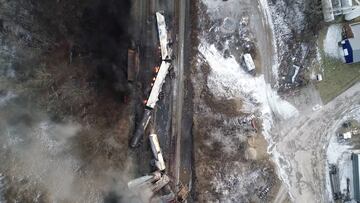Ohio train derailment: What is vinyl chloride and how dangerous is it?
Vinyl chloride is one of many potentially dangerous chemicals spilled during the catastrophic train derailment in East Palestine, Ohio.


How dangerous is vinyl chloride? The New Jersey Department of Environmental Protection puts it best:
“Vinyl Chloride is a CARCINOGEN in humans. There may be no safe level of exposure to a carcinogen, so all contact should be reduced to the lowest possible level.”
Vinyl chloride is used in the production of plastic products like PVC piping and was one of the chemicals being transported on the train that derailed in East Palestine, Ohio, on 3 February.
After a catastrophic derailment, the Environmental Protection Agency (EPA) continues to test the air quality, including for traces of vinyl chloride. While contact with the material should be avoided without the proper protective equipment, OSHA set “the legal airborne permissible exposure limit” to 1 ppm during an eight-hour shift or no more than five ppm “during any 15-minute work period.”
The EPA set the screening value at 0.5 ppm, and levels above that threshold have not been picked up in the area. On 13 February, one sensor picked up an average concentration of 0.2 ppm, with an additional two recording a lower concentration of 0.05 ppm during the testing window. The levels recorded have fallen in recent days. The air quality reports taken on February 10 and 11 found an average concentration of 0.3 ppm in some areas.
The chemical is colorless and, at levels over 3,000 ppm, has a mild and sweet order.
Symptoms to watch out for
If exposed to the chemical for an extended period of time, the effects can be fatal.
In less severe cases, exposure can trigger symptoms like dizziness, drowsiness, headache, blurred vision, numbness, and tingling sensation. If these issues are ignored, people can fall unconscious. For those in the blast area, it is critical to see a doctor if you or anyone in your household begins to present with these symptoms.
Public health experts raise concerns over the power of chemical companies in regulatory decisions
In 2005, three scientists warned that changes to the EPA’s chemical review process “that would give industry officials greater input in the science behind its risk reviews” could have catastrophic consequences for public health. The authors of the report acknowledged that while increasing the participation of the chemical industry could “reduce the agency’s review times,” it may allow corporations to “underregulate” themselves when it comes to determining “acceptable limits of public exposure.”
The scientists used the case of vinyl chloride to demonstrate how industry involvement may undermine the integrity of the EPA’s scientific review process and subsequent policy recommendations. The Toxicology Review and Integrated Risk Information System (IRIS) Assessement for vinyl chloride were finalized by the EPA in 2000. Initially, these documents had included findings from multiple studies that cited “suggestive epidemiological evidence that cancer of the brain, lung, and lymphopoietic system are associated with exposure.” However, in 1999 the agency received a letter from the chemical industry that raised doubts about connections to other types of cancer, aside from those that attack the liver, and called for these other threats to “be deleted from the final review.”
The EPA complied with these edits, a decision the three authors described as “striking” since there was no clear evidence that showed that by reducing the risk of liver cancer, all other organs would be protected. Such a decision precluded the EPA “from developing a standard based on an assessment of the total cancer risk to all organs,” which is required under the agency’s own guidelines.
This case highlights the power of corporations to influence government regulation and the threats to public health that can be associated with these interventions.
Railroad company opposition to regulation also increased the risk of deadly chemical exposure
In 2012, a train carrying vinyl chloride derailed in New Jersey, prompting the Obama adminstration to reexamine how highly hazardous materials are transported and classified.
The Department of Transportation began considering new rules to increase safety protocols for locomotives classified as a “high hazard flammable train.” Lobbyists from both the chemical and rail industry fought the government on these new requirements and were able to limit the scope of what trains would fall under this more scrutinized classification. Companies with trains that meet these classifications must inform state leaders before the cargo passes through, providing greater oversight capabilities to state-level authorities. On Tuesday, 14 February, Ohio governor Mike DeWine said that it was “absurd” that Norfolk Southern’s train did not meet the standard necessary and called on Congress to address these gaps.
We investigated the Norfolk Southern train derailment in Ohio.
— The Lever (@LeverNews) February 11, 2023
Here's what you need to know: pic.twitter.com/mBFzxbpfir
Additionally, these new rules would have required these high-risk trains to install state-of-the-art brake technology. However, when President Trump took office, members of his party put pressure on his administration to remove these requirements. Today, without pressure from the federal government, many cargo trains use brake systems that are not dissimilar to those developed during the 1800s.
David Sirota, who has reported widely on the regulatory battle between rail and chemical companies and the federal government, estimates that updating the brakes would have cost the rail industry around $3 billion.
Related stories
“That’s about two weeks of operating revanue,” said Sirota adding that the cost represented a “tiny amount of money when you are talking about the entire rail industry.”
During an interview with The Young Turks, Sirota said that the rail companies were opposed to the new rules “because they presume that their current safety systems are fine,” and if they fail, they know that “governments, local, state, or federal will pick up the tab for the cleanup.” Federal regulators, who spoke with Sirota, said that these new brake technologies could have avoided the crash in East Palestine.

